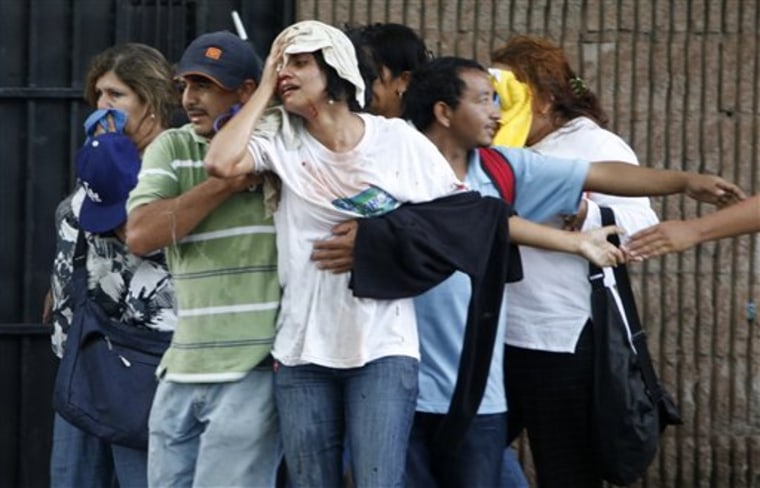Dealing with the first Latin American crisis of his presidency, Barack Obama sought a swift, clear response that would not be interpreted as U.S. interventionism in a region that loathes it.
So he condemned a coup in Honduras by turning to that most reliable standby: democracy.
"We stand on the side of democracy, sovereignty and self-determination," Obama said when asked Monday about the forced exile of Honduran President Manuel Zelaya, a takeover that has drawn international criticism and unnerved a part of the world that has worked to shed itself of strong-arm tactics.
The point could not be lost. Obama mentioned some version of the word democracy eight times. He even wound up referring to George Washington.
The response put Obama with much of the world as Honduras and its newly appointed leader, Roberto Micheletti, quickly found themselves isolated. Obama left sticky underlying issues in Honduras for its people to decide, but pledged that the U.S. would work with international bodies on a peaceful solution.
All that was clear. What comes next is cloudy.
New leaders stand by coup
Micheletti and the Congress that put him in place stood by their move after soldiers stormed the national palace and forced Zelaya into exile. Police and soldiers clashed with pro-Zelaya protesters in the capital on Monday, and about 5,000 anti-Zelaya demonstrators gathered at a main plaza in Tegucigalpa on Tuesday to celebrate his ouster.
The U.N. General Assembly on Tuesday unanimously condemned the military coup and demanded Zelaya's immediate return to power. Zelaya, who was in the assembly chamber for the vote, thanked the diplomats, calling the vote "historic."
Obama, wielding clout within the Americas as a popular voice of a powerful country, has outlined his approach. He will work within existing groups, particularly the Organization of American States that links the countries of the Western Hemisphere, and not try to dictate a solo U.S. response.
This is what he promised during a summit in Latin America just two months ago: The United States is an equal partner, not a senior partner, in the region.
But politically, a hostile removal of a democratically elected president demands a response from a U.S. president. So Obama, who was criticized by Republican critics for being too slow to react to Iran's postelection upheaval, quickly expressed concern on the day that Zelaya was booted from his country.
Then, in plain terms, Obama elaborated Monday after a meeting with a U.S. ally in the region, Colombian President Alvaro Uribe.
"We believe that the coup was not legal and that President Zelaya remains the president of Honduras," Obama said.
"It would be a terrible precedent if we start moving backwards into the era in which we are seeing military coups as a means of political transition rather than democratic elections," Obama said. "The region has made enormous progress over the last 20 years in establishing democratic traditions in Central America and Latin America. We don't want to go back to a dark past."
'Not always stood as it should'
Speaking of the past, Obama noted that the U.S. has "not always stood as it should" with democracies in the region. That, too, seemed to draw on the doctrine he promised to the region while in Trinidad in April, a view that the U.S. strengthens its hand by confessing when it has strayed from its own values.
Reinforcing the president's message, White House press secretary Robert Gibbs said Tuesday that the U.S. had spoken out on the Honduran situation to put to rest "any rumors that we were in any way involved in this."
"Despite whatever political disagreements you might have, there are democratic norms that have to and should be followed," Gibbs said.
Jose Raul Perales, a Latin American scholar at the Woodrow Wilson International Center, said Obama's response to the crisis was prompt and in unison with leaders of the hemisphere and beyond. Obama can bring considerable leverage to the matter and add credibility to an emerging regional response, he said.
But there are still bigger problems in Honduras — the failed democratic institutions that led the nation to resort to a military coup. The conflict came about after a referendum Zelaya had called in defiance of Honduras' courts and Congress, one seen as a way for him to stay in power beyond his term limit.
That means even if Obama can help lead a brokered peace, deeper issues remain. "The tensions will persist regardless of the outcome," Perales said.
Tensions are rising
Those tensions are rising in a conflict still in its early hours. Leftist leaders pulled their ambassadors from Honduras. Venezuelan President Hugo Chavez called for Hondurans to rise up against those who toppled his ally, Zelaya. The U.S. has not yet yanked aid or any envoys.
As Obama has with Iran — a deadly conflict of greater proportions — he has kept an emphasis on the rights of the people.
"I think what's ultimately most important is that the people feel a sense of legitimacy and ownership, and that this is not something imposed on them from the top," Obama said. He added there must not be "rigging of the electoral process or repression of opposition voices."
Obama's message seemed more blunt than that of his secretary of state, Hillary Rodham Clinton, earlier in the day. But they both emphasized the broader point of returning constitutional order.
When Clinton was asked directly whether the U.S. was insisting on Zelaya's return to power, she said, "We haven't laid out any demands that we're insisting on."
Obama has not faced the same question. Yet.
